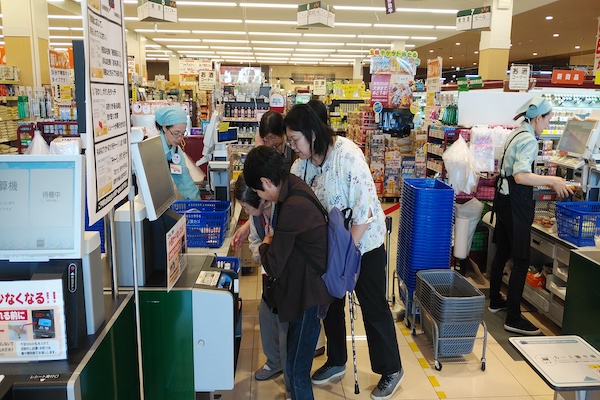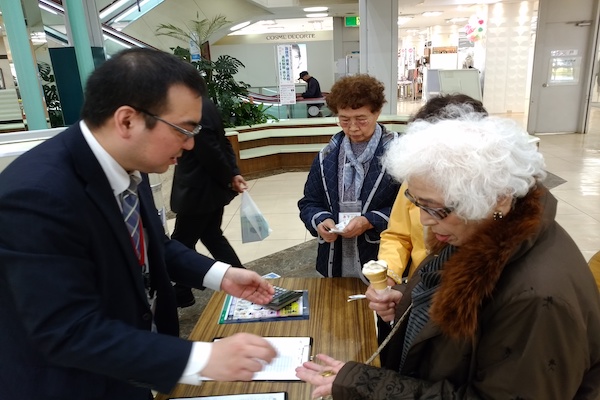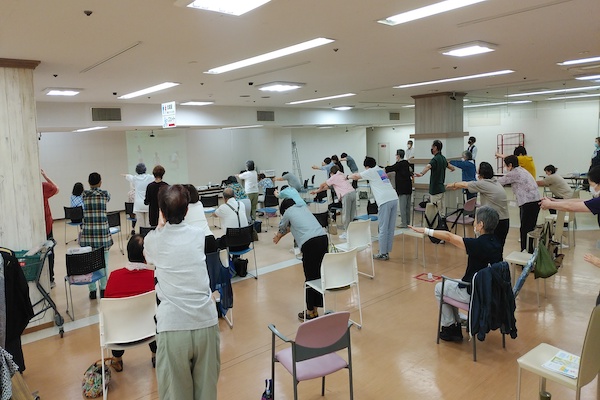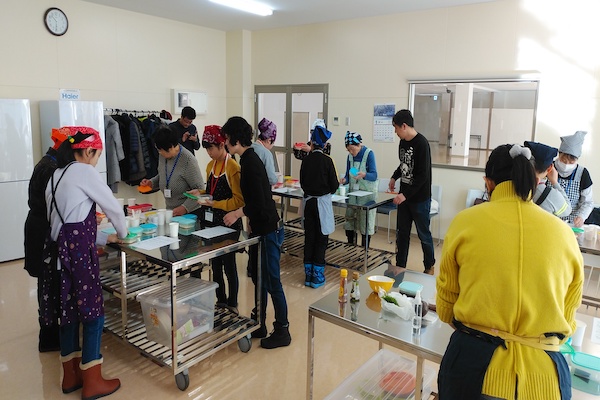2022 HAPI Second Prize Winner
Hakodate Asaichi, the morning market of Hakodate city, located on Japan’s northern island of Hokkaido, once flourished as the “kitchen of the local residents,” but recently, due to an increase in the tourist population, services for local residents have tended to be overlooked. Responding to the decline of this historic commercial district, a group came together to launch a project that seeks both to promote the revitalization of Hakodate Asaichi and to provide an opportunity to get older people out and about and connected to their community.
Odekake (Outing) Rehabilitation (referred to as “OdeReha” for short) is an original healthcare project mainly targeting older persons or those who require care and support. It combines the concept of “shopping, dining, and recreation” together with “activity, sports, and interaction” to create a comprehensive form of rehabilitation. At the same time, the project aims to contribute to the revitalization of local commercial environment by carrying out project activities in a local commercial district and making the outing itself a form of rehabilitation.
Seeking to combine these two goals the organizers started to restructure the shopping environment so that local customers, particularly older people, who had been visiting less in recent years, would be enthusiastic about using the market again. By encouraging customers to visit the market more frequently, it would contribute to revitalizing the local community as a whole, including street stores, local markets, and department stores. Through the OdeReha shopping outings, participants could also go through rehabilitation at the same time, improving their physical and cognitive functions and stimulating communication and connection with others. These activities contribute to both the physical and mental health of the older persons, and they promote healthy aging from a commercial and economic approach.
The project is organized by the Odekake Rehabilitation Promotion Council, which consists of about 17 groups including commercial facilities, long-term care facilities, therapists, as well as major beverage makers, taxi companies, etc. They work in close cooperation with local government agencies on logistical support, such as assigning local volunteers.
-1.jpg)




After conducting several study groups and a test run, OdeReha started officially in April 2017. The program initially faced a challenge in having enough care facilities sign-up. Although the promotion council informed 300–400 care-related facilities in the area about the program through printed materials such as pamphlets, only 10 percent of the facilities responded. The main reason behind the poor response was that the facilities did not have enough manpower to let staff accompany the outings. In order to solve this issue, a new volunteer service to support the care staff called “otasuke” (helpers) started from 2019. The purpose of “otasuke” was to reduce the work burden of the care staff, so through this service the staff could focus on caregiving, and this led to more facilities participating in OdeReha.
Since addressing this initial hurdle, OdeReha has seen a great deal of success and has carried out a total of 266 events with more than 3,200 people participating. They estimate the value in terms of additional sales generated at commercial sites at about ¥7 million (about US$48,000). Furthermore, about 70 percent of participants have been repeat users, meaning that people tend to stay engaged with the program. Caregivers also feel that the program has a positive impact, making comments such as, “Due to OdeReha, people who used to refuse to walk by themselves have taken the initiative in climbing stairs to buy gifts for their great-grandchildren. Also, the fun has enriched their expressions and conversations with their families have increased,” or “People who rarely go out of their rooms have started to go out with their families after experiencing OdeReha.”
Building on their success in Hakodate Asaichi, OdeReha is currently carried out in 11 other shopping complexes around the city as well. In addition to the ordinary outings, new recreation and learning classes have been introduced, encouraging community building among the older people. In 2021, they also launched an “OdeReha Health Program” that covers everything from baseline measurements for exercise to dietary habits, and this has become a new model for community alignment.
In order to generate income to carry out the project, OdeReha charges the commercial businesses that host their activities a nominal fee of ¥100/participant. In addition, these businesses are expected to bear the burden of other related expenses to carry out the outing such as recreation fees, taxi fees, and so on. The idea is that the business is a beneficiary of the program and so they should bear some of the financial burden as the cost of attracting new customers.
In its next phase, OdeReha plans to further expand by increasing the number of bases through more interaction between Hokkaido and the Tohoku region, located south of Hakodate on Japan’s main island of Honshu, eventually making OdeReha a nationwide project.
KEYS TO SUCCESS
- A point system using an original currency “odekake coins” was implemented, which is provided to users whenever they go on the shopping trips, or if they volunteer or participate in health activities. If they collect 10 coins, they can exchange them for a ¥500 voucher, so this system serves to incentivize people to participate.
- A unique approach was taken from the commercial and economic perspective, which aims to combine socialization and rehabilitation for older people with economic revitalization for the whole community.
- To encourage the participation of as many people as possible, OdeReha works together with local business and community groups, as well as long-term care facilities.
- The council works with administrative agencies such as local government offices for logistical support such as assigning local volunteers and calling on residents and other stakeholders.
Related Resources

